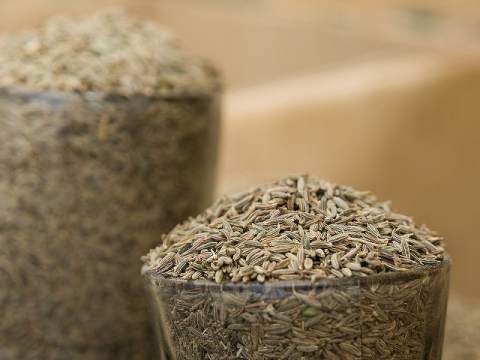
Due to its distinct flavor and its ability to improve digestion, cumin has been used for culinary purposes. Though cumin allergy is uncommon, there are few people who’re hypersensitive to proteins in cumin.
Profilin is a protein found in cumin seeds, which can trigger adverse reaction. If you’re sensitive to this protein, you may also experience allergic reaction with related foods like coriander and dill.
When you ingest cumin, immune system wrongly treats it as a threat and releases IgE antibodies. You may not see any allergic symptom in first use. Next time when proteins in cumin are detected by antibodies, it signals immune system to produce histamines, which react with proteins and results in cumin allergy symptoms.
Based on a 1997 journal, this allergic has been linked to mugwort and pollen allergy. So, you may see severe allergic symptoms in late summer.
Symptoms of Cumin Allergy
Signs of allergic reaction can be seen after consuming or coming in contact with cumin. Like any other food allergy, symptoms may range from mild to severe signs.
In very rare cases, severe reaction can lead to life-threatening conditions. Below are listed few common signs of cumin allergy, expert recommend consulting allergist for diagnosis.
- Skin rashes
- Hives
- Itching
- Swelling of lips, face and throat
- Runny nose
- Watery and red eyes
- Coughing, wheezing
- Tingling sensation in mouth
- Respiratory problem
- Breathing problem
- Headache and sinus pain
- Diarrhea
- Vomiting
- Abdominal pain
- Anaphylaxis
Severe symptoms may also include sudden drop in blood pressure, rapid pulse and throat swelling. React allergist or physician for diagnosis.
Prevention and Diagnosis
Only after diagnosis, main source of allergy can be determined. Allergist will conduct skin prick test and other related tests to confirm particular allergen. Based on allergen he/she will prescribe medication.
For severe allergic reactions, you must carry epinephrine injection to reduce the risk in emergency situations. Ask your doctor about immediate steps to be taken in such emergency conditions.
One of the best ways to prevent cumin allergy symptoms is to avoid it. Foods that are identical to cumin can also trigger allergic reaction. So, experts recommend avoiding products that include cumin and other related products. Check ingredients list and ask restaurant authority about the recipe.
Before you leave this post, allow me to write few lines on benefits of cumin. This herb is known to relieve from various health ailments like insomnia, asthma, bronchitis, piles, digestion issues, common cold, skin ailments, boils and anemia.
Properties like iron, manganese, vitamin C and other exceptional nutrients are packed in this herb. You can check out more benefits here.
Note: Consult allergist if you experience mild or severe cumin allergy symptoms.

